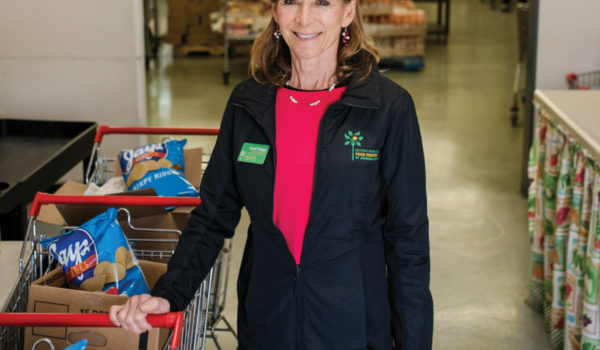
Phipps’ legacy is varied and will include Interchurch Food Pantry service
By Glenda Winders // Photography by Angela Jackson
Carol Phipps’ list of projects done for the good of Johnson County almost eclipses her professional resume, which itself is impressive. Raised in Chicago by “a stay-at-home mom who was never at home because she was involved in helping in so many different ways” and a dad who was also involved in the community, she graduated from Northwestern University with a bachelor’s degree and an MBA.
She launched her career in manufacturing management with Procter & Gamble and later was human resources director at Eli Lilly and Co., the job that brought her to Indiana. Lilly had a management track that involved moving employees to different departments to see where they would best fit. When Phipps got to human resources, she knew she was home.
“My degrees were in industrial engineering and business, but I found that I really loved the people side of things,” she says. “In human resources I was able to work with employees to help them understand what their talents were, what their goals were and where they wanted to be someday.”
Notes of service
Even while she was raising a family and managing a demanding job, she found ways to be of service. Some of that work was on boards, but perhaps most rewarding was teaching music to low-income children at Christamore House in Indianapolis. A musician who plays five instruments — piano, organ, violin, guitar and saxophone — she began the program on her own with three piano students. When musician colleagues saw how much fun she was having, they signed on, too, and eventually there were 15 teachers who taught more than 200 children. Recently one of her former students’ mothers invited her to a concert at the Hilbert Circle Theatre to see him play as first-chair violinist with the Indianapolis Metropolitan Youth Orchestra.
“That was the culmination for me,” she says. “He played beautifully, and I was so proud of him. He hugged me, and his mom told me he never would have been able to do that if I hadn’t given him a start.”
Following early retirement, she taught classes in human resources management, employment law and HR certification at IUPUI, for which she earned an Outstanding Associate Faculty Award in 2017. She also played the piano at Von Maur department store. But she had known for a long time that there was something much bigger she really wanted to do.
“I could clearly see my future focused full time on making a difference in the community,” she says. “I felt the calling to do something meaningful for others.”
Feeding a need
Through work with the United Way she learned that one of the county’s greatest needs was food, and through the church she attended at that time she discovered the Interchurch Food Pantry of Johnson County and began to volunteer there.
“I wanted to get into a role immediately where I was having a direct impact on people’s lives,” she says. “And after the first time I volunteered, I was hooked.”
When the unpaid pantry manager left a year later, Phipps and another volunteer put forth a proposal to job-share and manage the operation together. She loved grant-writing, fundraising and working with computers. Her partner was better at building maintenance and ordering. They closed the deal and kept the pantry moving.
Moving on up
After several years, Phipps says, their original location in Whiteland was “bursting at the seams.” With the aid of a generous benefactor they were able to move to their present location at 211 Commerce Drive in Franklin. They also changed the way they distributed food. Previously the people who came submitted a list, and volunteers boxed up the items they needed. Now they could shop as if they were at a grocery store with guidance and encouragement from the volunteers.
“We were able to serve twice as many people, and we gave them about twice as much food,” Phipps says. “The feedback we got from the families receiving food was that they loved our new approach. They had never been able to interact with the volunteers before.”
By that time the pantry was receiving more donations of food from grocery stores, restaurants and school lunch programs.
“It’s a thrill to identify new donors of food that otherwise would have been thrown into a dumpster,” she says.
The food pantry’s biggest challenge came with the COVID-19 pandemic. March 13, 2020, was the last day they were able to operate in the revised fashion because they couldn’t have that many families and volunteers — sometimes up to 125 people at one time — in a relatively small area. They also didn’t know if they would have enough volunteers to do what needed to be done since many of their helpers were in high-risk demographics for the virus.
Refashioning the food distribution
Over the course of the following weekend, they put the word out to churches, the newspaper and social media that they needed more volunteers, and they reconfigured their service to be a drive-thru. Now masked and socially distanced volunteers load boxes with standard items — peanut butter, canned fruits and vegetables, pasta and the like.
When families arrive, they receive an order form from which they can choose meat, dairy and deli items. Then they can stop at a huge winter tent and get out of their cars (if masked) to select whatever fresh fruits and vegetables they want and as much as they want since produce is naturally an area where they receive the biggest donations.
Families also get a wish list where they can request items not in stock, and volunteers do their best to track them down. Not surprisingly, the No. 1 item on those lists in 2020 was toilet paper.
The pantry distributes government commodities, so it operates under those income guidelines for determining who is eligible. No one has to show identification or proof of income. A simple nod of the head that they fit the parameters gets them through the door. Families can come once a week, and for the duration of the pandemic, the pantry has extended its services to anyone who needs to come, even if they don’t live in Johnson County.
Since the arrival of the pandemic the number of households they serve has nearly doubled from 80 families to 140, but donations have increased, too. And the call for volunteers led to younger people coming out to help.
“The pandemic showed me the real care inside our community,” Phipps says. “It has just been amazing. People have given of their time, talent and treasure — time through volunteering — and we’ve had many very talented volunteers whom we’ve now tapped into more leadership sorts of roles. And food and monetary donations have been so significant that we are able to serve that many more people.”
Bringing it home
Organizing a home delivery service has been another silver lining of the pandemic and the realization of a wish Phipps has had for several years. Many people who need food are house-bound or don’t have a means of transportation. One woman was walking to the pantry with a wheelbarrow as a way to get her groceries home. The virus made it even more difficult since some people had COVID and others were caring for family members who were ill or quarantining because they were susceptible. That being the case, volunteers now provide delivery of whatever patrons need.
The pantry is open Monday through Friday, with some 80 regular volunteers giving their time, often more than once a week. On any given day 15 to 20 are there at work.
“It is so warming to see what people are doing to make our community a better place,” Phipps says. “Many of our volunteers are working people who arrange their schedules so they can take a day off and come in to work. They say they do it because they want to help others.”
Phipps, meanwhile, has become the executive director, a dream come true, she says, sharing leadership with the two people who manage the pantry together now and still coming in three days a week to volunteer.
“I jokingly call Carol our Energizer bunny,” says board member Dorcas Abplanalp. “But she would wear the bunny out. Her energy increases as she works tirelessly for others. She exemplifies the characteristics of a servant leader. Her interaction with volunteers, clients and board members is positive, encouraging and empathetic. She really listens to understand what they are saying, their feelings and perspectives.
“Volunteers work longer and harder in the environment that Carol has created, and clients walk away feeling respected and with their dignity intact. She also came up with our vision statement, ‘Imagine a world without hunger.’”
Abplanalp added that last year the pantry gave away almost $4 million worth of food, thanks in part to alliances Phipps has forged with Gleaners Food Bank and other organizations.
Four years ago Phipps’ husband, family practice physician Dr. Lee Phipps, passed away suddenly, which only caused her to work harder.
“His passing reinforced what I was doing,” she says. “I decided that the best way to deal with loss was to engage and double up my efforts to make a difference.”
She keeps going …
Seeing the needs of the people she was meeting in her work at the pantry, she became involved early on in an initiative called Bridge Alliance, which trains people to get ahead.
“None of our people who come through to get food want to have to come to a food pantry,” she says. “They want to get ahead in life. They want to be in a position where they could be helping others instead of asking for food.”
Participants enroll in a 14-week structured curriculum called “Surviving to Thriving,” where they learn skills and strategies (some that Phipps teaches) to help them achieve their goals. For 18 months after that, they are matched with an “ally” who supports them on their journey. Phipps says she is delighted that the group’s effort has led to jobs, education, housing and transportation for people she has come to know from the pantry as well as others who take advantage of the program. The organization also seeks to address some of the causes of systemic poverty in the community.
Another group with which she became involved around that time was 100 Women Who Care Johnson County.
“I was a member in another community and saw what it could do there,” she says, “so I gathered several colleagues and approached the Johnson County Community Foundation director and said,
‘Wouldn’t it be great if we could do this in Johnson County?”
At the first meeting in 2016 there were 48 women, so the first grant they awarded was $4,800. The goal was to persuade 100 women to give $100 each quarter so they could give larger grants that could really make a difference. When they surpassed that goal, they started calling themselves 100-plus Women Who Care. They have 153 members now, and when they celebrate their fifth anniversary this year, they will have given $250,000.
Philanthropically minded
As if all this weren’t enough, Phipps wanted to teach her adult sons, Mike, a doctoral student at the University of Illinois, and Frankie, a master’s student at Northwestern University, about philanthropy as well as take part in a matching funds program Lilly was offering, so she established the Phipps Family Fund with the JCCF.
“Carol has worked for years to tirelessly provide much-needed services and financial support to Johnson County and the surrounding areas,” says Gail Richards, executive director of JCCF. “She fulfilled a lifelong goal of hers to provide a legacy for the future of Johnson County organizations and causes by establishing a long-term endowment fund with the Johnson County Community Foundation. Her fund will provide support for agencies for many years in the future.”
Phipps, who has lived in Greenwood since 1993, says she loves all things sports-related and spends what spare time she has outdoors. She bikes, runs, plays golf, racquetball and tennis, and hikes. When she turned to yoga as a way to deal with her grief over her husband’s death, she found it so therapeutic that she went through a training program at Studio You and became an instructor. She also still gives music lessons.
“There is a side of me that loves to teach,” she says. “There’s nothing better than trying to excite youth, keep them engaged and make it fun. But I do that on the side in my spare time. My true focus is on community service.”
Phipps says one of her favorite quotes comes from Winston Churchill: “You make a living by what you get; you make a life by what you give.” Another favored quote: “Where there is hope, there’s faith; where there is faith, miracles happen.”
“If enough people do small acts of kindness all of us can make a big difference in this world together,” she says. “If we keep the hope and the faith, we will see miracles happening around us.”


